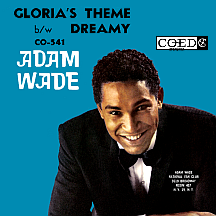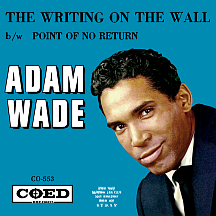ADAM WADE
When homegrown Pittsburgh pop singer Adam Wade's career starting taking hold in 1960, his vocal style drew generally favorable comparisons to Johnny Mathis. Later, when asked point-blank by an interviewer, he disputed the reference, revealing that as a youngster he'd admired Nat "King" Cole and had patterned his style after the singer during his teens when initially considering a career in music. This was several years before anyone had even heard of Mathis (the two had one thing in common, though: they were very good basketball players during their school years). Wade scored three consecutive top ten hits in 1961, but sustaining that kind of momentum seemed nearly impossible in the following years. So he shifted to other showbiz interests: acting, writing and any unexpected opportunities that might develop.
Born Patrick Henry Wade in 1935, his parents abandoned him as a very young child in the late 1930s; soon afterwards, young Pat was adopted by paternal grandparents Henry and Helen Wade. After a move to the Homewood neighborhood of east Pittsburgh, he attended Westinghouse High, taking music classes and singing in addition to playing basketball; one of his teammates was Maurice Stokes (an outstanding NBA player of the mid- to late-1950s whose career was sadly cut short by a blow to the head during a game that left him permanently paralyzed). After graduating in 1952, Wade majored in science at Virginia State College and served for a time as captain of the school's basketball team. He left college early after marrying his high school sweetheart, then secured a position at the University of Pittsburgh School of Medicine in 1956 as a laboratory assistant to Dr. Jonas Salk, who'd become newsworthy the previous year after developing a successful polio vaccine that eliminates symptoms in the vast majority of those who have contracted the disease.
In 1958, Wade and a friend, singer-songwriter Richard Baugh, took a road trip to New York City to audition for various record companies. Former big band musician George Paxton of startup label Coed expressed interest in him as a singer, suggested he change his first name (to avoid any potential confusion with superstar Pat Boone) and signed him to a contract. Coed Records established itself quickly with "16 Candles" and other '59 hits by Brooklyn group The Crests. Adam Wade's first recording session in late 1959 produced a ballad penned by Selma Craft (wife of Morty Craft, with whom she'd composed The Shepherd Sisters' top 20 1957 hit "Alone"); "Tell Her For Me" actually fooled many people who thought it was a new Mathis single. It had a mid-chart run in early 1960, setting the stage for an appearance on the game show To Tell the Truth with host Bud Collyer, where he competed against two impostors claiming to be Adam Wade. An excerpt of the song played at the beginning of the episode. Three of the four panelists incorrectly identified him; Polly Bergen was the only one who saw through the ruse. This wasn't the last time Adam would appear on a game show!
"Ruby," penned by concert pianist Heinz Roemheld and lyricist Mitchell Parish, had been the theme from Ruby Gentry, a 1952 film directed by King Vidor that starred Jennifer Jones in the title role; another mid-chart seller in 1960, it became Wade's signature tune...for a little while, at least. His star had risen to a point where he was offered a spot opening for Tony Bennett at New York's high-profile Copacabana nightclub. Paxton served as the orchestra leader on his recorded output; four more singles were issued in 1960, two of which reached the lower regions of the national charts: "I Can't Help It," a Hank Williams standard from nearly a decade earlier, and "Gloria's Theme," another song about a lead character in a movie, current hit Butterfield 8, for which Elizabeth Taylor won her first of two Best Actress Oscars. The song was written by Bronislaw Kaper (an Oscar winner himself for the score of the '53 female-led feature Lili starring Lesley Caron) and prolific lyricist Hal David.
Adam's increased exposure paid dividends in 1961, starting with "Take Good Care of Her," an Arthur Kent-Ed Warren song, one in a long line of sad-former-lover stories ('I must accept it, she loves you more than me...so with my broken heart, I'll bow out gracefully...'). Its April-May top ten run was followed immediately by "The Writing on the Wall," which utilized the same thought process and reached the top five in June, its songwriting credited to George Eddy (a pseudonym for Paxton), Mark Barkan and Sandy Baron (a Broadway actor and comedian who penned several hit songs over the years). In September, Scott David and Larry Kusik's entry in the heartbreak trilogy, "As If I Didn't Know," reached Billboard's top ten. All three releases made their marks over a brief, but lucrative, six-month span.
As with so many other whirlwind hitmakers, the dropoff was rapid. Two-sider "Tonight I Won't Be There" (another from Kent and Warren) and the Jack Lawrence standard "Linda" landed briefly in the fall, while other releases throughout 1962 floundered in "bubbling under" territory, suffering perhaps due to a sameness in Paxton's arrangements. Adam left Coed in mid-'62 and signed with Epic Records, where producers like Al Kasha, Clyde Otis and Bob Morgan put in their best efforts, calling on seasoned, hitmaking arrangers Robert Mersey, Joe Sherman, Burt Bacharach, Alan Lorber, Ray Ellis, Stan Applebaum and others; nearly every single had a different team trying their hand and while the end results were often strong, nothing seemed to connect.
Wade finally returned to the pop chart in early 1965 with "Crying in the Chapel," a spiritual composition by Artie Glenn that had been a country and pop hit in 1953 for his son, Darrell Glenn, as well as an R&B and pop smash for The Orioles at the same time. While Adam's smooth rendition was barely a blip on the Billboard radar, a version by Elvis Presley (recorded five years earlier) became a million seller just a few months later. Producer Manny Kellem and arranger Teacho Wiltshire, the team who'd turned the marginal trick for Wade, worked with him for another year until it just seemed pointless. After "A Man Alone," produced by Kellem with arranger Klaus Ogerman in late '66, the not-so-Epic era came to an end.
The small-screen version of Edgar Rice Burroughs' Tarzan, starring Ron Ely as the jungle hero, provided a beginning for Adam in television. He appeared in a December 1966 episode, though a few years passed before he landed any further roles. His final major label shot came with Warner Bros.-Seven Arts in 1967 and '68. His first effort, the sweetly-rendered "Julie on My Mind," seemed like a good bet. Yet this and two other WB singles were largely ignored. While studying at New York's Al Fann Theatrical Ensemble, he was mentored by future Oscar nominee Adolph Caesar; over the next couple of years, Adam landed guest roles in episodes of The F.B.I. and Adam-12. Occasional recordings appeared on small labels, but acting had become his main focus.
His first movie role came in 1971 with Shaft, the famous, era-defining crime film starring Richard Roundtree, though he only had a small part. He was cast in similar productions over the next few years, some considered part of the "blaxploitation" B-movie trend including Come Back Charleston Blue, Across 110th Street, Gordon's War and Crazy Joe, in addition to a slightly larger role in Claudine, a romantic film that earned star Diahann Carroll an Oscar nomination. Popular sitcoms of the '70s (Sanford and Son, Good Times, The Jeffersons, What's Happening!!) kept him working steadily, as did dramas (mostly cops-and-crime) like Kojak, Police Woman and Hill Street Blues.
To many, he's remembered as the first African-American game show host, a distinction that came with its share of disapproval in the still-racially-charged '70s. His stint on Musical Chairs, which lasted just 20 weeks, contained nothing controversial, but it only took the image of a black person in a role never before seen to bring the bigots out of their hiding places. The series bore little resemblance to the original Musical Chairs of the mid-'50s; this newer version, developed by music mogul Don Kirshner, asked music trivia questions and challenged contestants to identify song lyrics (Adam's most-used phrase on the show was "Is the next line...?," followed by three multiple-choice options). The weekday afternoon series served as an outlet for well-known guest singers, including The Tokens, Bobby Rydell, The New Christy Minstrels and then-current hitmakers The Spinners, alongside up-and-coming stars Jane Olivor, Sister Sledge and Irene Cara. And, of course, Adam performed on a regular basis...sometimes he sang his own hits!
He took one final shot with his recording career. "Keeping Up with the Joneses," on the Kirshner label in 1977, had a funky groove. It could have been a hit. But instead, he and soon-to-be wife Jeree Palmer (who'd been a backing singer on Musical Chairs) worked together to create On Kentucky Avenue, an acclaimed stage musical set at Atlantic City's Club Harlem. The couple took part in several other stage shows during the 1980s (a Las Vegas production of Guys and Dolls and an off-Broadway musical, Shades of Harlem), while Adam supplied vocals for TV commercials and resumed taking college courses to earn Bachelor's and Master's degrees, which led to positions as a Professor of Speech and Theater at Long Island University and New Jersey's Bloomfield College. Despite late-life difficulties with Parkinson's disease, he remained active until just before his death at age 87.
To many music fans, he is fondly remembered for those three big hits of 1961. "Take Good Care of Her" has had the most exposure, with recorded versions by more than three dozen popular artists. Four of these have impacted different genres: in 1966, Sonny James' remake reached number one on the country charts, while Mel Carter had some success with the song at pop radio. Two versions made an impact in 1973: it was a favorite of Elvis Presley, who often performed the song in concert...then Johnny Mathis took his turn with the tune, bringing the public's early impression of Adam Wade full circle. But there was obviously more to the man from Pittsburgh than most of us realized.
NOTABLE SINGLES:
- Tell Her For Me - 1960
- Ruby - 1960
- I Can't Help It - 1960
- Gloria's Theme - 1960
- Take Good Care of Her - 1961
- The Writing on the Wall /
Point of No Return - 1961 - As if I Didn't Know - 1961
- Tonight I Won't Be There /
Linda - 1961 - Preview of Paradise - 1961
- It's Good to Have You Back With Me /
How Are Things in Lovers Lane - 1962 - For the First Time in My Life - 1962
- There'll Be No Teardrops Tonight - 1962
- Don't Let Me Cross Over - 1963
- Teenage Mona Lisa - 1963
- (Theme from) Irma La Douce (Look Again) - 1963
- Crying in the Chapel - 1965
- A Man Alone - 1966
- Julie on My Mind - 1967
- Half the World - 1969
- Girl on the Beach - 1970
- Brother on the Run - 1973
- Keeping Up With the Joneses - 1977




